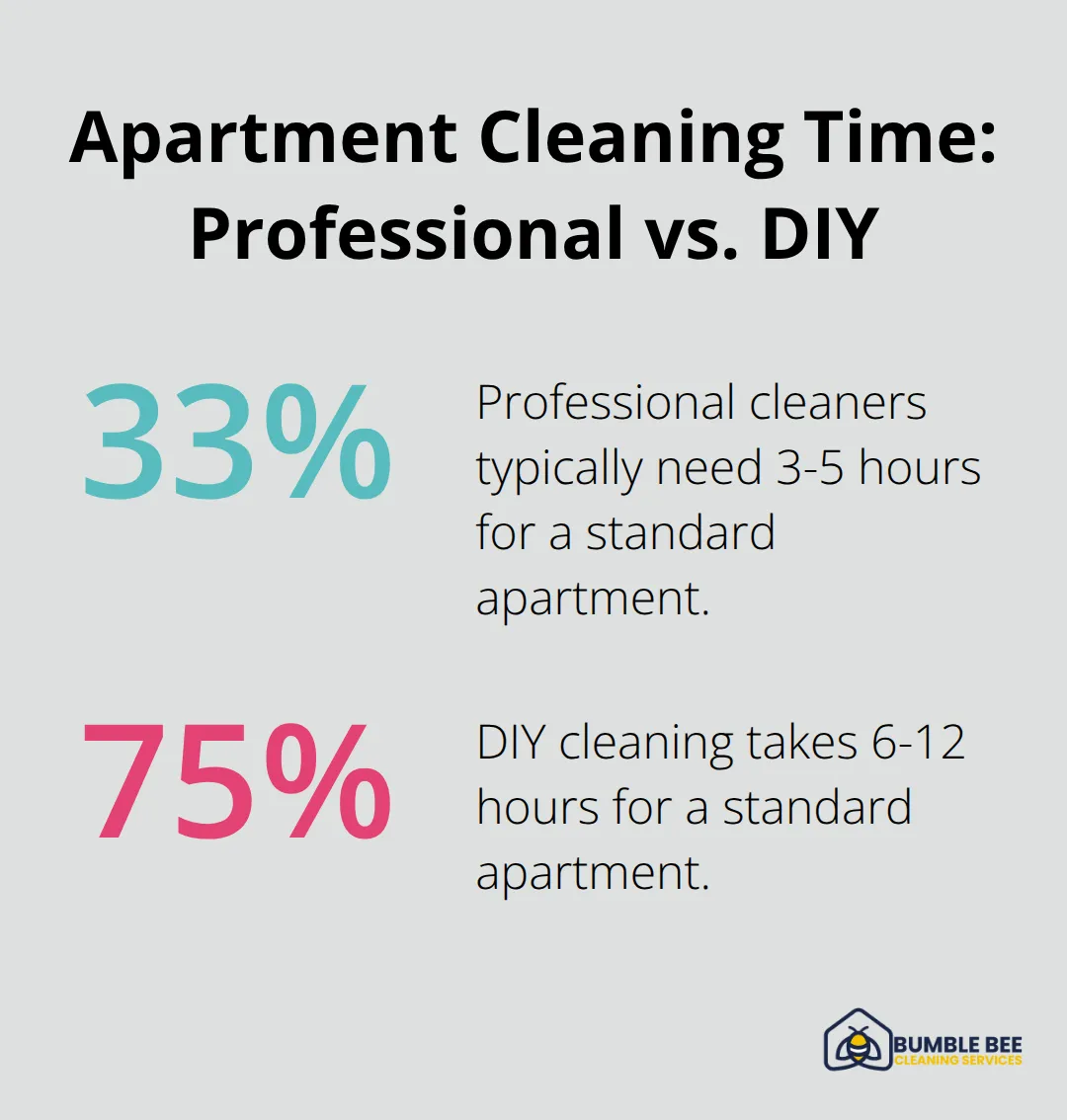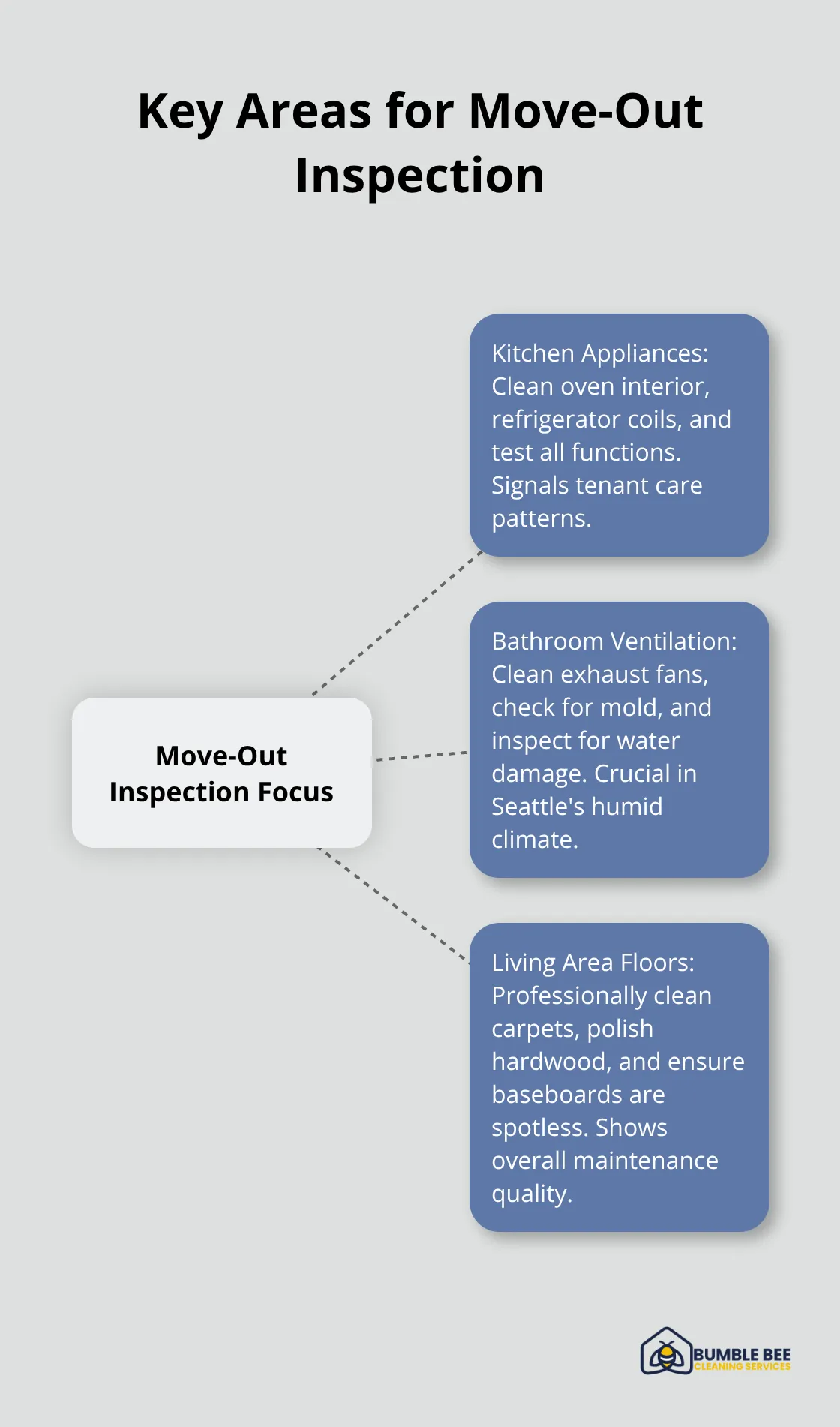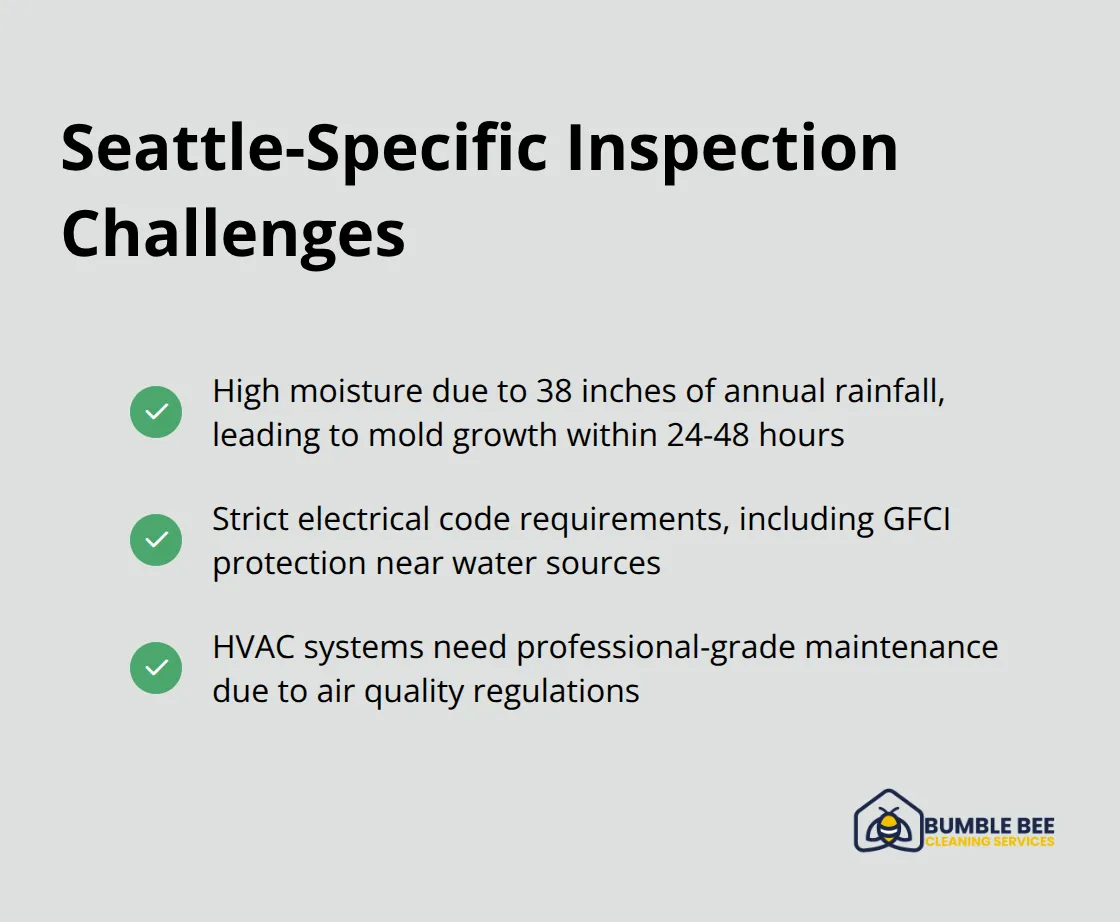Seattle’s rental market demands spotless properties for successful move-out inspections. Property managers expect perfection, and even minor oversights can cost you your security deposit.
We at Bumble Bee Cleaning Services have helped hundreds of Seattle renters pass their inspections with flying colors. The right preparation strategy makes all the difference between getting your full deposit back and losing hundreds of dollars.
What Should You Do Two Weeks Before Your Inspection?
Start your preparation exactly 14 days before your scheduled inspection date. Professional cleaners typically need 3-5 hours to clean a standard apartment, while DIY cleaning takes 6-12 hours according to industry data. This time difference means you need adequate preparation to avoid last-minute panic.

Schedule Your Deep Clean Strategy
Focus on high-impact areas that landlords scrutinize most heavily. Kitchens and bathrooms receive the most attention during inspections, so allocate 60% of your clean time to these spaces. Remove soap scum and hard water stains with a vinegar-water mixture on all glass surfaces and mirrors. Clean inside all appliances, including the refrigerator coils and oven interior.
Baseboards collect dust and grime that tenants often miss, yet inspectors notice immediately. Wipe down every light fixture and ceiling fan blade, as these areas show neglect clearly. Professional services like Bumble Bee Cleaning Services excel at these detail-oriented tasks that make the difference between pass and fail.
Complete Minor Repairs Immediately
Fill every nail hole with compound and touch up paint where needed. Replace all burnt-out light bulbs and test every electrical outlet. Check that all cabinet doors and drawers open smoothly without resistance. Tighten loose screws on handles and hinges throughout the property.
Address any drips from faucets or toilets that run continuously, as plumbing issues signal poor maintenance to landlords. These small fixes prevent major deductions from your security deposit.
Document Everything Thoroughly
Take timestamped photos of every room before you begin clean and repair work. Keep receipts for all supplies, repair materials, and professional services you purchase. Seattle law requires landlords to provide you with a written lease or rental agreement and a checklist when you start renting.
Professional move-out services cost between $500 to $650 in Seattle, but this investment often prevents you from losing significantly more from your security deposit. With proper documentation and thorough preparation complete, you can now focus on the specific areas that inspectors examine most closely in each room.
Which Areas Do Inspectors Examine Most Closely

Kitchen Appliances Reveal Your Care Patterns
Kitchen appliances demand meticulous attention because landlords know these areas show tenant care patterns most clearly. Clean your oven interior completely and remove all grease buildup and food residue that accumulates over months of use. Scrub refrigerator coils and defrost completely if ice buildup exists, as poor appliance maintenance signals neglect to property managers.
Test every burner and oven function to verify proper operation, since broken appliances often result in immediate deposit deductions. Wipe down all cabinet interiors and check that drawers slide smoothly without resistance or sticking.
Bathroom Ventilation Systems Need Special Focus
Seattle’s high humidity creates mold problems faster than other cities, which makes bathroom ventilation absolutely essential during inspections. Clean exhaust fan blades thoroughly and test that fans move air effectively, as poor ventilation leads to moisture damage that costs hundreds to repair.
Inspect caulk around tubs and showers for black mold or deterioration, and replace any damaged sections immediately. Check under sinks for water damage or warped floors, since even minor leaks create expensive problems in Seattle’s wet climate (with 38 inches of annual rainfall). Remove all soap scum from shower doors and tiles with vinegar solutions, as buildup suggests poor maintenance habits to landlords.
Living Area Floors Show Maintenance Quality
Vacuum carpets professionally or rent commercial equipment, since regular home vacuums miss deep dirt that inspectors notice immediately. Professional carpet cleaning costs $0.25 to $0.50 per square foot, but this expense prevents much larger deposit losses from stained or damaged carpets.
Hardwood floors need proper care and polish to remove scuff marks and restore shine, while laminate surfaces require specific cleaners that won’t cause streaks or damage. Check baseboards for scuffs and clean thoroughly, as these areas collect dirt that tenants typically ignore but inspectors examine closely.
These detailed room preparations help you pass inspection, but Seattle’s unique climate creates specific challenges that require targeted solutions. Consider post-construction cleaning costs if you’ve made any renovations or repairs during your tenancy.
What Inspection Problems Hit Seattle Renters Hardest

Moisture Creates Expensive Problems Fast
Seattle’s 38 inches of annual rainfall creates moisture problems that destroy security deposits faster than any other issue. Mold grows within 24 to 48 hours in damp conditions, and property managers know exactly where to look for hidden growth behind furniture and in corners. Check under bathroom sinks, around window frames, and behind toilets for black spots or musty odors that signal mold development. Wipe down all surfaces with bleach solutions and run dehumidifiers in problem areas for at least 72 hours before inspection day.
Water stains on ceilings or walls indicate roof leaks that tenants often ignore until inspection time, but these issues can cost hundreds in repair deductions. Test all faucets and shower heads for proper water pressure and fix any drips immediately, since minor leaks create floor damage in Seattle’s humid climate.
Electrical Code Violations Stop Inspections Cold
Seattle electrical codes have specific requirements for outlet protection near water sources, and missing proper protection fails inspections immediately. Test every bathroom and kitchen outlet with a simple GFCI tester (available for under $10 at hardware stores), and replace any non-functioning outlets before inspection day. Smoke detectors must function in every bedroom and hallway, while carbon monoxide detectors need fresh batteries on every floor of multi-level properties.
Overloaded circuits from extension cord use create fire hazards that property managers take seriously, so remove all temporary wiring and test that every outlet works properly. Replace burnt-out bulbs throughout the property and verify that all light switches operate correctly.
HVAC Systems Demand Professional Standards
Change furnace filters 30 days before inspection, since dirty filters reduce air quality and signal poor maintenance to landlords. Clean air vents and ductwork openings thoroughly, as dust buildup shows neglect that inspectors notice immediately. Test heating and cooling systems to verify proper temperature control, since broken HVAC equipment often results in significant repair costs that landlords may deduct from deposits.
Seattle’s air quality regulations require proper ventilation in bathrooms and kitchens, so clean exhaust fans and verify they move air effectively. Poor ventilation creates moisture problems that compound quickly in Pacific Northwest weather conditions (especially during the rainy season from October through April).
Final Thoughts
Your move-out inspection success depends on a systematic final walkthrough 24 hours before the scheduled date. Walk through each room with your landlord’s checklist and address any issues immediately. Take final photos of every space to document the property’s condition and protect yourself from unfair deductions.
Professional services provide the best insurance policy against deposit losses. We at Bumble Bee Cleaning Services have helped hundreds of Seattle tenants recover their full deposits through our comprehensive move-out inspection preparation expertise. Our team uses eco-friendly products and provides quality service that makes the investment worthwhile compared to potential deposit losses.
Start to plan for your next rental’s maintenance from day one. Schedule quarterly deep cleans, address repairs immediately when they occur, and document everything with photos and receipts (this prevents stress and expense of last-minute preparation). Seattle’s rental market rewards tenants who maintain properties consistently, and this approach saves both time and money in the long run.
